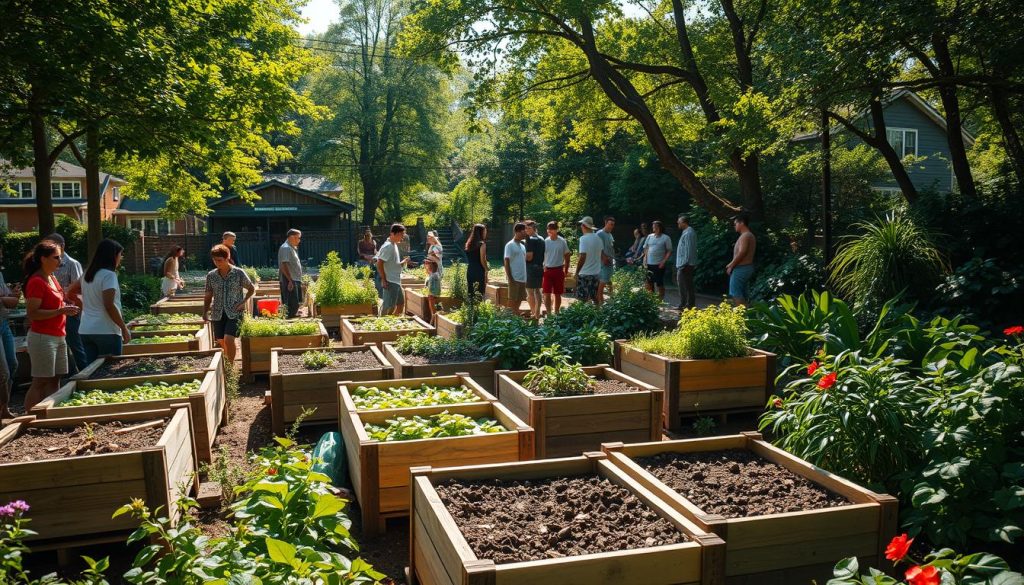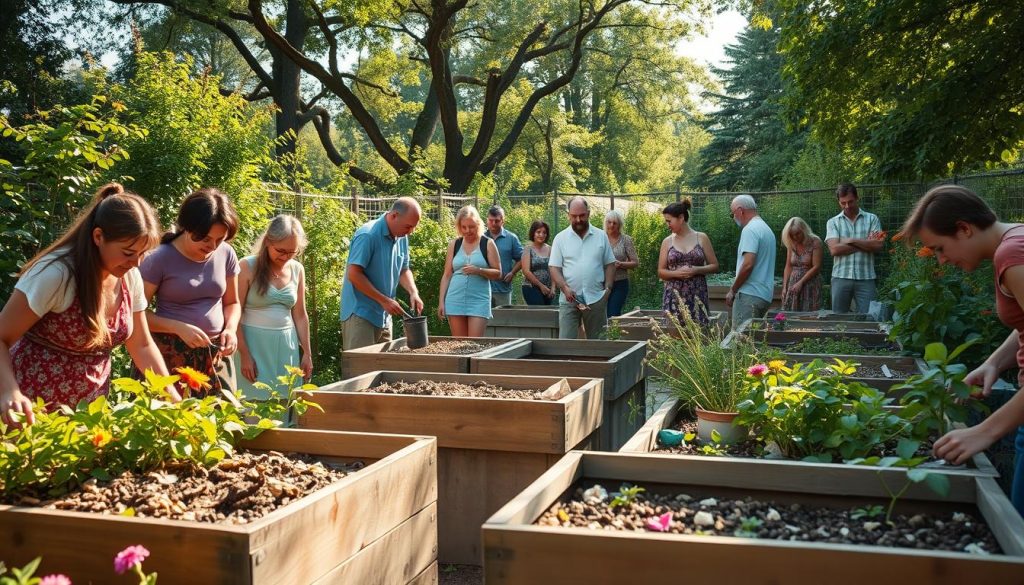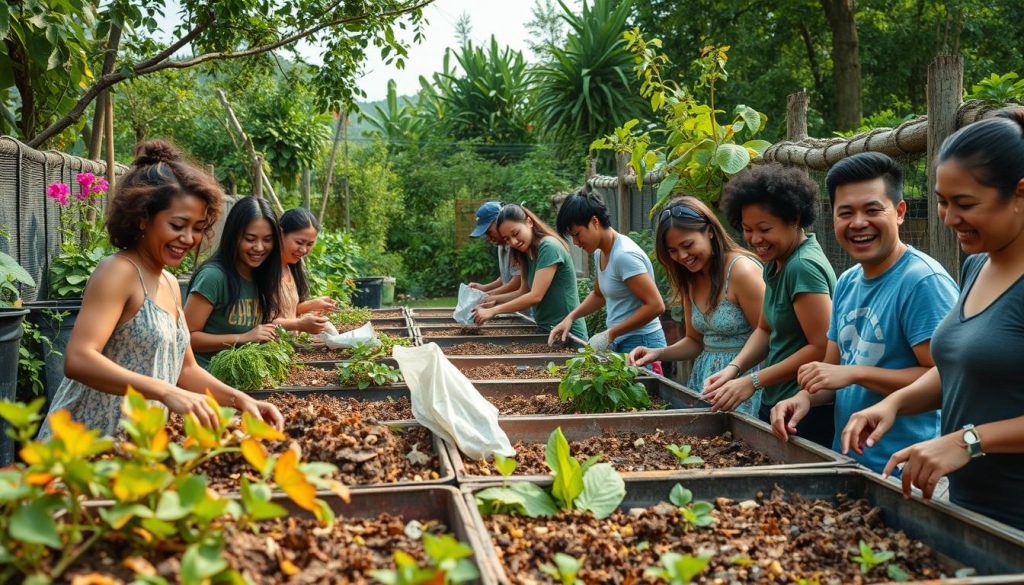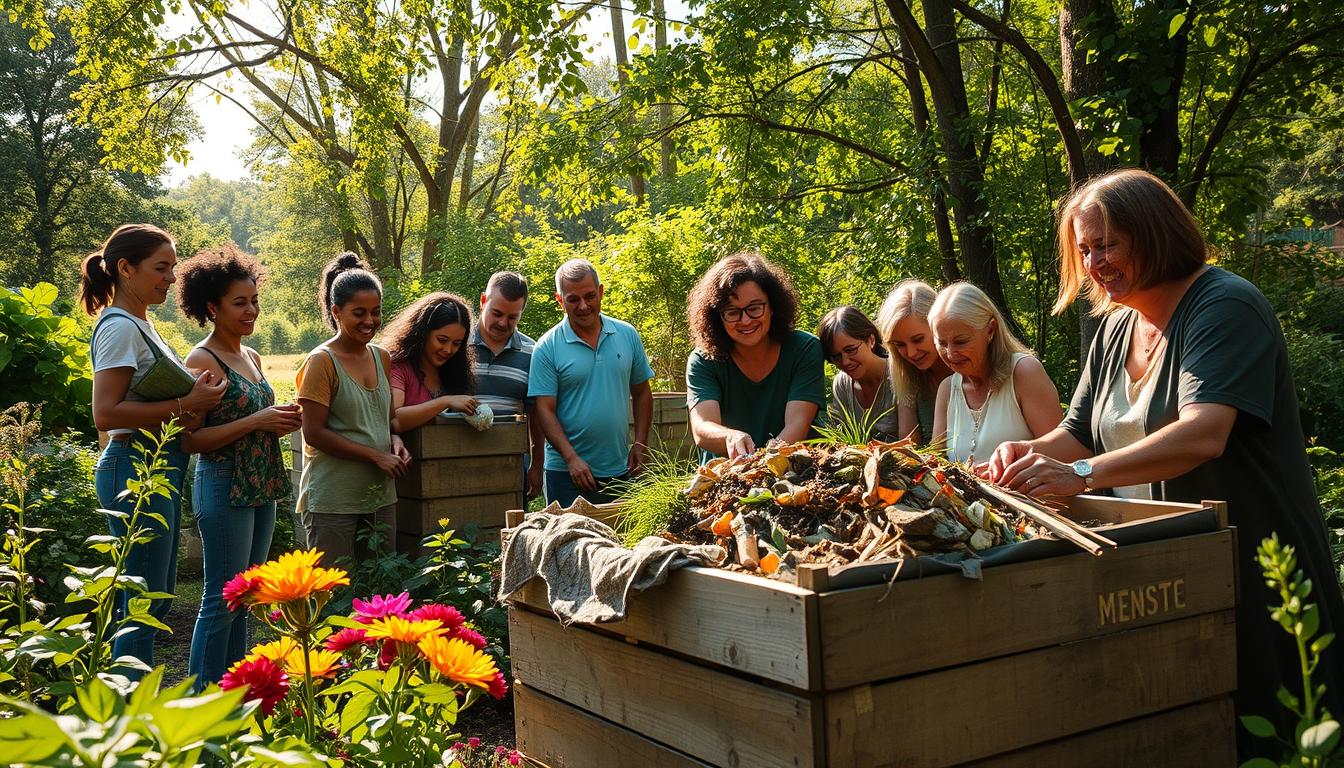I’m excited to share my love for community composting. It changes how we see waste and care for our planet. These programs are key to making our communities greener.
Joining community composting efforts helps cut down landfill waste. It also makes soil better for plants. Neighborhood programs make it easy for everyone to help.
Together, we can make a big difference through composting. It’s a step towards a sustainable future. I think it’s vital for our planet’s health.
Understanding Community Composting
Exploring community composting, I see how it cuts down waste and boosts city sustainability. Projects like composting bring people together, helping the environment and fostering community spirit. Learning about community composting helps us see why it’s so vital.
Community composting turns food waste and other organic stuff into soil full of nutrients. It’s a team effort that reduces landfill waste and gives back to local gardens. In cities, composting is key to lessening waste and supporting green living.
What is Community Composting?
Community composting gathers and processes organic stuff like food waste and leaves to make soil. It can be big or small, depending on the community’s needs.
Key Benefits of Composting in Communities
Composting in communities offers many advantages:
- It cuts down landfill waste.
- It creates valuable soil for gardens and parks.
- It encourages community learning and teamwork.
- It supports city sustainability and caring for the environment.
Joining community composting projects helps us support green initiatives. In cities, composting is especially important for reducing waste and promoting eco-friendly living.
My Journey into Composting
I remember the day I joined the local composting movement. It changed my view on waste and sustainability. The grassroots efforts in my area inspired me to get involved.
Exploring composting, I saw its many benefits. It reduces landfill waste and improves soil health. I was excited to start by attending a community event, where I met others who cared about the environment.
How I Got Started
Starting with composting was simple. I set up a bin in my backyard for food and yard waste. I learned about mixing “green” and “brown” materials to speed up composting.
The First Community Composting Event I Attended
The first event I went to opened my eyes. I met locals passionate about composting and learned about community projects. The event had workshops, demos, and exhibits, offering valuable insights. 
My composting journey showed me the power of local efforts. These initiatives reduce waste, promote sustainability, and unite communities. I’m excited to keep learning and contributing to a greener future.
The Environmental Impact of Composting
Exploring composting showed me its big environmental benefits. By joining local composting efforts, we can greatly help our planet. Composting cuts down on waste sent to landfills, lowering harmful emissions and fighting climate change.
Some key composting advantages are:
- Less trash in landfills by diverting organic waste
- Better soil health with nutrient-rich compost
- Helping local food systems with natural fertilizer
Composting helps our environment and supports green communities. Programs and projects at the city level are key in spreading composting and reducing waste.
Through composting, I’ve seen its positive effects on our planet. Simple changes in our daily lives can lead to a greener future. This supports local composting initiatives and city-wide projects.
Building Community Through Composting
Exploring community composting showed me its power in connecting neighbors. It brings people together, like in my neighborhood. Through community composting, we share knowledge and support each other.
Some key benefits of community composting include:
- Sharing knowledge and resources, such as composting techniques and equipment
- Building relationships with neighbors and like-minded individuals
- Fostering a sense of community and cooperation
Community composting can range from backyard projects to big ventures. It’s all about coming together. By joining, we reduce our environmental footprint and make connections.

My experience in community composting shows its value in building strong communities. Together, we can make a sustainable, connected world. It starts with one compost pile at a time.
Overcoming Common Challenges
As I explored community composting, I faced several challenges. Space was a big issue in crowded areas. But, neighborhood compost programs offered valuable help.
One way to beat space problems is using vertical composting systems. We also started community composting projects. This way, we worked together to make our community greener.
Addressing Space Limitations
- Utilize vertical composting systems to maximize space
- Implement community-wide composting initiatives to encourage participation
- Collaborate with local organizations to provide resources and expertise
Tackling Odor and Pests
To solve odor and pest issues, we balanced our compost pile. We also turned it regularly. This kept our composting successful and sustainable.
Success Stories in My Community
I’ve seen how the local composting movement has changed my community for the better. It has brought people together, creating a sense of unity. These efforts have not only cut down on waste but also raised awareness about living sustainably.
Local Initiatives That Inspire Me
Some initiatives that stand out include:
- Community gardens that use compost to grow food
- Workshops and programs teaching about composting
- Partnerships between local businesses and residents to reduce food waste

How Residents Have Benefited
The composting movement has greatly helped residents. It has given them access to fresh food, reduced waste, and strengthened community bonds. It has also given people chances to learn new things and contribute positively to their area.
Getting Involved in Community Composting
Exploring community composting, I found it’s simpler than I thought. It’s a way to support sustainability and help the environment. By joining local programs, we can all make a difference.
First, look for community composting projects near you. Many cities have programs that help. Also, check with gardening groups, community centers, or churches for initiatives.
Finding Local Programs
- Search online for community composting initiatives in your area
- Check with local gardening groups, community centers, or places of worship
- Contact your local government to see if they have any municipal composting programs
Steps to Start Your Own Initiative
If no local programs exist, start one. You can gather neighbors or join a community garden. Always follow local rules and ask for help when needed.
Joining community composting efforts helps us build a greener future. Let’s start today and see the good we can do together.
The Future of Community Composting
I see a future where cities focus on composting. This will be thanks to city-wide and collaborative projects. Together, we can reduce waste and support sustainability.
Trends to Watch
Technology is changing composting for the better. Automated systems and smart sensors make it easier for city folks. I also see more groups working together to share composting spaces.
My Vision for a Greener Community
I dream of a world where every neighborhood composts. Imagine food waste turned into compost for gardens and parks. With city-wide and collaborative efforts, we can make our cities greener and more sustainable.

